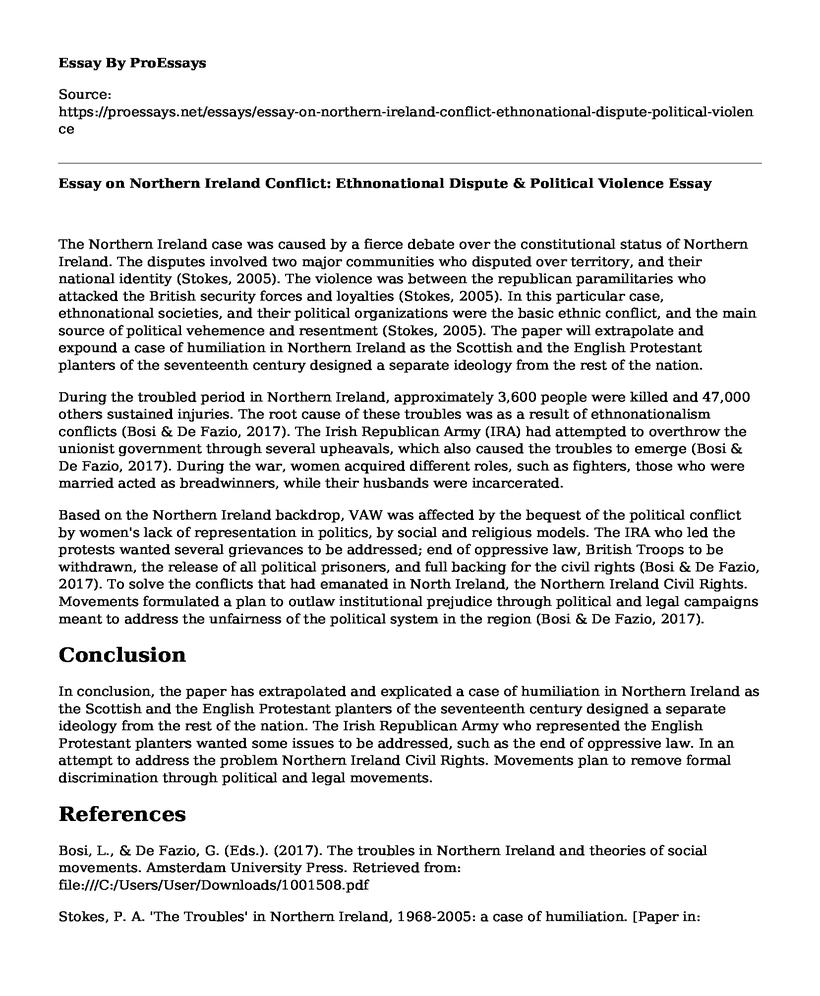The Northern Ireland case was caused by a fierce debate over the constitutional status of Northern Ireland. The disputes involved two major communities who disputed over territory, and their national identity (Stokes, 2005). The violence was between the republican paramilitaries who attacked the British security forces and loyalties (Stokes, 2005). In this particular case, ethnonational societies, and their political organizations were the basic ethnic conflict, and the main source of political vehemence and resentment (Stokes, 2005). The paper will extrapolate and expound a case of humiliation in Northern Ireland as the Scottish and the English Protestant planters of the seventeenth century designed a separate ideology from the rest of the nation.
During the troubled period in Northern Ireland, approximately 3,600 people were killed and 47,000 others sustained injuries. The root cause of these troubles was as a result of ethnonationalism conflicts (Bosi & De Fazio, 2017). The Irish Republican Army (IRA) had attempted to overthrow the unionist government through several upheavals, which also caused the troubles to emerge (Bosi & De Fazio, 2017). During the war, women acquired different roles, such as fighters, those who were married acted as breadwinners, while their husbands were incarcerated.
Based on the Northern Ireland backdrop, VAW was affected by the bequest of the political conflict by women's lack of representation in politics, by social and religious models. The IRA who led the protests wanted several grievances to be addressed; end of oppressive law, British Troops to be withdrawn, the release of all political prisoners, and full backing for the civil rights (Bosi & De Fazio, 2017). To solve the conflicts that had emanated in North Ireland, the Northern Ireland Civil Rights. Movements formulated a plan to outlaw institutional prejudice through political and legal campaigns meant to address the unfairness of the political system in the region (Bosi & De Fazio, 2017).
Conclusion
In conclusion, the paper has extrapolated and explicated a case of humiliation in Northern Ireland as the Scottish and the English Protestant planters of the seventeenth century designed a separate ideology from the rest of the nation. The Irish Republican Army who represented the English Protestant planters wanted some issues to be addressed, such as the end of oppressive law. In an attempt to address the problem Northern Ireland Civil Rights. Movements plan to remove formal discrimination through political and legal movements.
References
Bosi, L., & De Fazio, G. (Eds.). (2017). The troubles in Northern Ireland and theories of social movements. Amsterdam University Press. Retrieved from: file:///C:/Users/User/Downloads/1001508.pdf
Stokes, P. A. 'The Troubles' in Northern Ireland, 1968-2005: a case of humiliation. [Paper in: Humiliation and History in Global Perspectives. Lindner, Evelin Gerda and Wyatt-Brown, Bertram (eds).]. Social Alternatives, 25(1), 17.
Cite this page
Essay on Northern Ireland Conflict: Ethnonational Dispute & Political Violence. (2023, Mar 02). Retrieved from https://proessays.net/essays/essay-on-northern-ireland-conflict-ethnonational-dispute-political-violence
If you are the original author of this essay and no longer wish to have it published on the ProEssays website, please click below to request its removal:
- Political Science: Emergence of Racism Cases in America Essay
- Essay Example on US-China Trade War: Top Leaders' Phone Call to Resume Negotiations
- Essay Example on From Tradition to Modernity: Footbinding in China (1839-1911)
- Paper Example on Chained & Mumbling: Mental Illness in West Africa
- 74 People Selected in 82-Year History to Serve on Federal Reserve Board - Paper Example
- 2020 Campaign: Exploiting Partisan Divide to Create Division - Free Paper Sample
- Freedom as a Conscious Choice: Exploring Hannah Arendt's Perspective on Liberty and Responsibility







